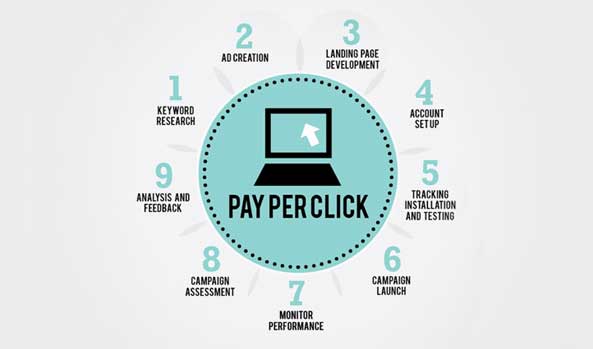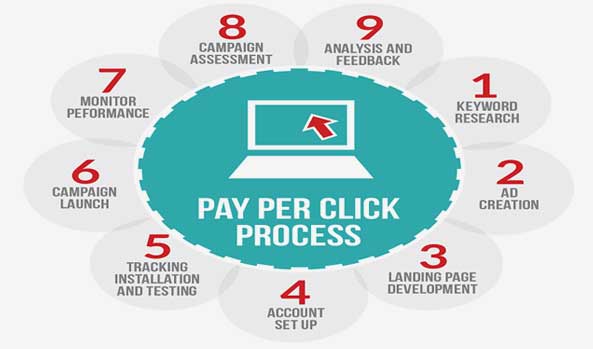Pay-per-click (PPC), also known as cost per click (CPC), is an internet advertising model in which an advertiser pays a publisher (typically a website owner or a network of websites) when the ad is clicked.
Search engine advertising, also called pay-per-click advertising, typically refers to advertisements placed on search engines. Search engine advertising usually refers to advertisements placed on first-tier search engines (such as Google AdWords and Microsoft Bing Ads). The ads are usually listed under a specific keyword phrase relevant to the advertiser’s target market. Content sites commonly charge a fixed price per click rather than use a bidding system. In contrast, banner ads are commonly referred to as “display” advertisements because they appear on pages with related content; banner ads are often not pay-per-click advertising. Social networks like Facebook and Twitter have also adopted pay-per-click as one of their advertising models.
However, websites can allow for the use of pay-per-click ads. The website owner will then choose keywords that will trigger the display of an advertisement when someone searches for those terms. These ads will appear at the top or bottom of the search engine results page or on the side of a web page if the site owner chooses. They are also referred to as sponsored links or sponsored ads.
PPC marketing is a great way to get your business the exposure it needs. However, it can be tricky to get right. The fact that anyone can create a PPC ad means you’re bound to encounter some bad ones along the way. However, allow us to take you on the way to creating effective ads in no time!
First, let’s look at PPC and how it works.
What is PPC?
Pay-per-click (PPC) is a model of internet marketing in which advertisers pay a fee each time one of their ads is clicked. The idea behind PPC is that it allows you to focus on getting visitors to your site, rather than attempting to “earn” those visits organically.
Search engine advertising is one of the most popular forms of pay-per-click (PPC) advertising. It allows advertisers to pay for their ad to appear at the top of a search engine results page, where people are most likely to see it when searching on a related keyword. For example, if we pay to have our ad shown on the results page when someone searches for “PPC software,” our ad might be displayed as the very first listing on Google’s search results page.
Each time our ad is clicked, sending a visitor to our website, we pay a small fee to the search engine. When PPC is working correctly, the fee is trivial because the visit is worth more than what we pay for it. In other words, if we pay $3 for a click and the click results in a $300 sale, then we’ve made a hefty profit.
Pay-per-click (PPC) advertising is a form of online marketing that enables companies to generate web traffic by purchasing ad space from search engines. The price charged by a search engine depends on the relevance of the ad to the search terms, which are known as keywords. The more relevant and specific your ad copy and landing page are, the lower your PPC costs will be. This is because PPC is an auction model: The more likely users are to click on an ad, the higher its rank in the auction and thus the lower its cost per click (CPC).
What is Google AdWords?
Google AdWords is the single most popular PPC advertising system in the world. The AdWords platform enables businesses to create ads that appear on Google’s search engine and other Google properties.
AdWords operates on a pay-per-click model, in which users bid on keywords and pay for each click on their advertisements. Every time a search is initiated, Google digs into the pool of AdWords advertisers and chooses a set of winners to appear in the valuable ad space on its search results page. The “winners” are chosen based on a combination of factors, including the quality and relevance of their keywords and ad campaigns, as well as the size of their keyword bids.
More specifically, who gets to appear on the page is based on and advertiser’s Ad Rank, a metric calculated by multiplying two key factors – CPC Bid (the highest amount an advertiser is willing to spend) and Quality Score (a value that takes into account your click-through rate, relevance, and landing page quality). This system allows winning advertisers to reach potential customers at a cost that fits their budget. It’s essentially a kind of auction. The below infographic illustrates how this auction system works.
Conducting PPC marketing through AdWords is particularly valuable because, as the most popular search engine, Google gets massive amounts of traffic and therefore delivers the most impressions and clicks to your ads. How often your PPC ads appear depends on which keywords and match types you select. While a number of factors determine how successful your PPC advertising campaign will be, you can achieve a lot by focusing on:
- Keyword Relevance – Crafting relevant PPC keyword lists, tight keyword groups, and proper ad text.
- Landing Page Quality – Creating optimized landing pages with persuasive, relevant content and a clear call-to-action, tailored to specific search queries.
- Quality Score – Quality Score is Google’s rating of the quality and relevance of your keywords, landing pages, and PPC campaigns. Advertisers with better Quality Scores get more ad clicks at lower costs.


PPC Keyword Research
Keyword research for PPC can be incredibly time-consuming, but it is also incredibly important. Your entire PPC campaign is built around keywords, and the most successful AdWords advertisers continuously grow and refine their PPC keyword list. If you only do keyword research once, when you create your first campaign, you are probably missing out on hundreds of thousands of valuable, long-tail, low-cost and highly relevant keywords that could be driving traffic to your site.
An effective PPC keyword list should be:
- Relevant – Of course, you don’t want to be paying for Web traffic that has nothing to do with your business. You want to find targeted keywords that will lead to a higher PPC click-through rate, effective cost per click, and increased profits. That means the keywords you bid on should be closely related to the offerings you sell.
- Exhaustive – Your keyword research should include not only the most popular and frequently searched terms in your niche, but also to the long tail of search. Long-tail keywords are more specific and less common, but they add up to account for the majority of search-driven traffic. In addition, they are less competitive, and therefore less expensive.
- Expansive – PPC is iterative. You want to constantly refine and expand your campaigns, and create an environment in which your keyword list is constantly growing and adapting.
Managing Your PPC Campaigns
Once you’ve created your new campaigns, you’ll need to manage them regularly to make sure they continue to be effective. In fact, regular account activity is one of the best predictors of account success. You should be continuously analyzing the performance of your account and making the following adjustments to optimize your campaigns:
- Add PPC Keywords: Expand the reach of your PPC campaigns by adding keywords that are relevant to your business.
- Add Negative Keywords: Add non-converting terms as negative keywords to improve campaign relevancy and reduce wasted spend.
- Split Ad Groups: Improve click-through rate (CTR) and Quality Score by splitting up your ad groups into smaller, more relevant ad groups, which help you create more targeted ad text and landing pages.
- Review Costly PPC Keywords: Review expensive, under-performing keywords and shut them off if necessary.
- Refine Landing Pages: Modify the content and calls-to-action (CTAs) of your landing pages to align with individual search queries in order to boost conversion rates. Don’t send all your traffic to the same page.
You’ll learn more about all of these elements of PPC campaign management as you move forward through the coursework in PPC University.
If you’re ready to get started with PPC, skip ahead to learn how to set up an AdWords account.
Never pay over the odds
Lone companies bidding at prices much higher than the norm – either to ensure the absolute pole position on the SERP or, more frequently, due to a lack of good pay-per-click management – can lead to considerable price gaps between competitors’ bids.
As your bid only needs to be 1p more than the closest bid to win the higher position on the SERP, it makes good financial sense to bid slightly over the lower of two bids placed by your competitors and still achieve a premium position on the SERP, than it does to try to outbid the lone competitor who is paying way over the odds in a fight for the absolute top spot.
Stay one step ahead
This intelligent approach to PPC bid management will maximise the efficiency of your marketing budget and make this medium a low-cost acquisition and branding tool for your online business.
Give your company a competitive advantage in this marketplace by getting in touch with one of our pay-per-click consultants today.





